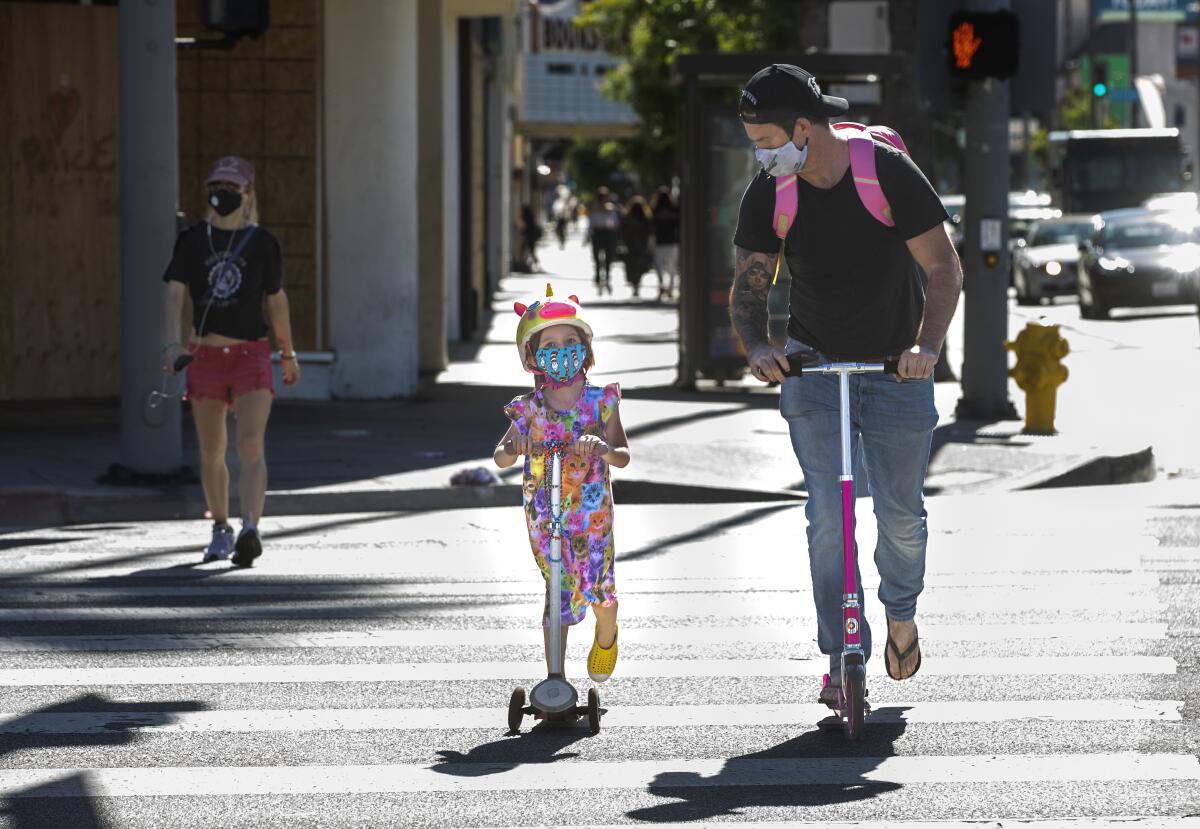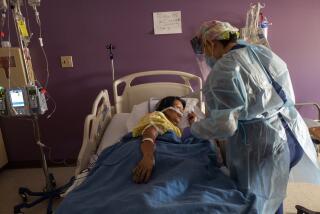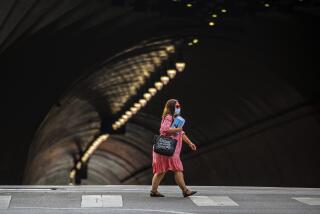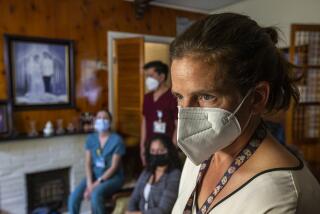Coronavirus hospitalizations rise in parts of California, jeopardizing wider reopenings

Health officials have said that the public needs to look beyond the rising number of coronavirus cases in California and focus on whether hospitalizations are increasing as a sign that reopening the economy is leading to new outbreaks.
Statewide, coronavirus hospitalizations have been relatively flat for the last six weeks, even as officials have allowed myriad businesses to open their doors and people have begun to resume old routines.
But in some parts of California, hospitalizations are again on the rise, according to a Los Angeles Times data analysis. And if the trend continues, it could force officials to slow the pace of reopenings.
The reasons for the upticks vary and are open for debate, but health officials have expressed concern about some people not following safety recommendations, including wearing face coverings and social distancing.
“We have met the enemy, and they are us,” said Dr. Robert Levin, the health officer in Ventura County, where hospitalizations are up. “And many of us have to do a better job of social distancing and quarantine. Some of us are doing a great job; we’re stalwarts. If we can do this — and I know we can — we can prevent the state from telling us that we must take a step back from some of the gains we’ve made in opening our activities and businesses.”
Last week, there were an average of 91 people hospitalized in Ventura County with confirmed or suspected coronavirus infections, the highest such number since early April. That’s a 75% increase from each of the previous two weeks, The Times analysis found.
Orange County has experienced a 76% jump in coronavirus intensive care unit hospitalizations in the last six weeks. In the week of May 4, the county reported a seven-day average of 94 people with confirmed or suspected coronavirus infections in its ICU beds. Last week, that number rose to an average of 165 hospitalized.
The eight-county San Joaquin Valley has seen a 45% rise in coronavirus ICU hospitalizations in the last six weeks.
Meanwhile, L.A. County and statewide ICU hospitalization rates have been declining.
L.A. County once had the worst ICU coronavirus hospitalization rate on a per capita basis among all of California’s 58 counties. But that’s changed, with Imperial County, Kings County and now Orange County having larger ICU coronavirus hospitalization rates, The Times analysis found.
L.A. County now reports 5 ICU coronavirus patients per 100,000 residents; Orange County is now reporting 5.2 ICU patients per 100,000 residents; Kings County, 6.1 ICU patients per 100,000 residents; and Imperial County, 9.9 ICU patients per 100,000 residents.
Though Ventura County health officials say there is still plenty of space in its hospitals, it’s possible the county might have to press the pause button on reopening additional sectors of the economy if hospitalizations continue to rise.
“At this point, it would be foolhardy to just open up and continue to open up everything given … what our numbers are doing,” Levin said during Tuesday’s meeting of the county’s Board of Supervisors.
Ventura County allowed in late May the resumption of in-restaurant dining, in-store shopping and hair styling. Gyms and bars were allowed to reopen last Friday. California officials are set to allow counties to decide starting this Friday whether to reopen nail salons, tattoo shops and massage therapy establishments in counties that have filed paperwork to accelerate their reopening.
Levin, however, said it was not a given that such personal-care industries would be able to reopen on that date. “I personally would like to see them open,” he said, “and we’re going to do our best to make that happen as we evaluate the numbers.”
Even as more spaces reopen, though, he said it was vital that residents continued to observe physical distancing to stem the spread of the virus.
Santa Barbara County and the San Joaquin Valley are also being closely watched for increasing coronavirus hospitalizations, according to the state Department of Public Health.
Santa Barbara County is seeing increased hospitalizations in the northern part of the county. The increase has been blamed on rising community transmission due to a growing number of gatherings, as well as workplace spread. Outbreaks in skilled nursing facilities are also a factor.
The same problems are being blamed for an increase in hospitalizations in San Joaquin County, east of the San Francisco Bay Area.
And in the the broader San Joaquin Valley, one of the nation’s most important agricultural areas and home to 4.2 million residents, increasing hospitalizations were reported in Kern and Kings counties, where nursing home outbreaks are also a contributing factor.
In the last three days, five counties across the state have experienced more than a 10% rise in patients hospitalized with COVID-19: Contra Costa (13%), Kings (18%), San Joaquin (12%), Santa Barbara (27%) and Stanislaus (42%).
Increasing hospitalizations and elevated disease transmission have been recorded in Kern County amid outbreaks at state and federal prisons as well as because of residents in nearby counties being admitted to the Kern County hospital, state officials said.
Kings County has reported a number of outbreaks, including at a meatpacking plant in Hanford and its Adventist Health hospital. An outbreak at Avenal State Prison caused the virus to spread to nearby areas — including Fresno County — carried by prison employees returning home.
In Tulare County, home to cities including Visalia, Tulare and Porterville, state officials are closely monitoring elevated disease transmissions related to outbreaks in nursing homes and workplaces, as well as the difficulty in preventing transmission within households.
And Imperial County, east of San Diego, is also experiencing elevated disease transmission as Americans return from Mexico, which is experiencing a worsening outbreak.
A recent surge in hospitalizations in Sacramento County was linked to members of the same household who gathered for birthday parties and a funeral.
Dr. Olivia Kasirye, Sacramento County’s health officer, said many people think “we’re out of the woods,” but health experts continue to warn of the seriousness of the virus and the need for safety and health precautions as larger swaths of the state continue to reopen.
On Monday, California reported nearly 3,400 new cases of the coronavirus, the highest number at the start of a week since the outset of the pandemic.
Despite the continued rise in infections, California’s top health officials have said that overall case counts are not necessarily a measure of how the state is faring in its fight against the novel coronavirus, noting that increased testing can drive up the number.
“We’ve ramped up testing in an extraordinary way, nearly hitting our goal that was set for August — not June, not July, but August — of getting to 60,000 to 80,000 tests a day,” said Dr. Mark Ghaly, the state’s secretary of Health and Human Services. “We’re already knocking on that door, averaging in the mid- to high 50s over the past few days across the state.”
Officials, instead, are closely monitoring two metrics as they gauge how California is handling the pandemic: the positivity rate, or the percentage of people who have tested positive, and the daily number of hospitalizations. A rise in the former could mean an uptick in community transmission separate from increased testing. A rise in the latter may mean that more people are becoming seriously ill, possibly jeopardizing the ability of the healthcare system to deal with the influx in patients.
Los Angeles County has seen its ICU cases consistently decline. Six weeks ago, there were an average of 633 people in L.A. County ICUs daily during that seven-day period. Last week, there were 501, a decline of 21%.
In Los Angeles County on Monday, 1,956 people with confirmed or suspected coronavirus infections were in hospitals, according to the state health agency. Officials are working with the state to prepare for the possibility of an influx in patients.
Health officials noted last week that coronavirus transmission continues to worsen in Los Angeles County, bringing with it the chance that the nation’s most populous county could run out of intensive care unit beds in two to four weeks. The numbers have not reached danger levels yet, but health officials said they are monitoring conditions carefully for any signs of new pressures on hospitals.
Times staff writer Colleen Shalby contributed to this report.
More to Read
Sign up for Essential California
The most important California stories and recommendations in your inbox every morning.
You may occasionally receive promotional content from the Los Angeles Times.













